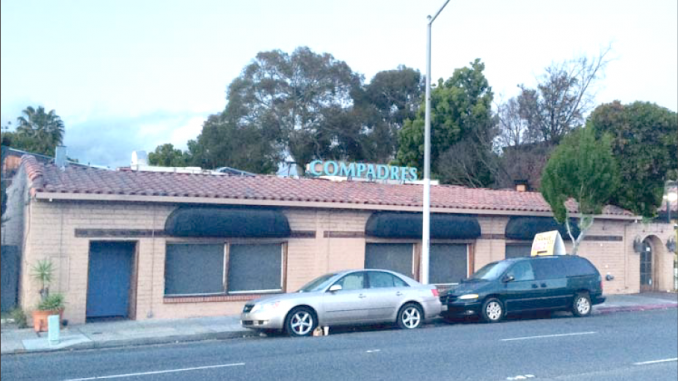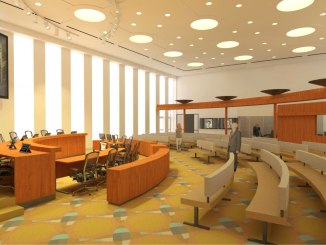
Compadres Mexican Bar and Grill at 3877 El Camino Real in Palo Alto has been closed since 2008. Post file photo.
BY ALLISON LEVITSKY
Daily Post Staff Writer
A plan to build 17 apartments above two floors of retail and office space on the El Camino Real site where Compadres Mexican Bar and Grill had been was nudged ahead by Palo Alto City Council Monday night (Sept. 18).
The council voted 7-0-2 to approve the project for 3877 El Camino. Councilwoman Lydia Kou was absent from the meeting and Councilman Eric Filseth was out of the room at the time of the vote.
The project is one of 11 developments in the works for El Camino in Palo Alto, and nearly all of them would create housing. The 17 apartments include two below-market-rate housing units. It would also have 3,200 combined square feet of retail and office space.
The project is not subject to the city’s Retail Preservation Ordinance because it was first proposed before that law was passed.
The development was allowed to exceed the maximum square footage allowed under city zoning law because of the state’s density bonus law. The density bonus law allows a developer to exceed city zoning requirements in exchange for building affordable or senior apartments.
Cost question
But under that state law, computer scientist Jeff Levinsky said, the applicant must demonstrate how the excess square footage would reduce a project’s construction cost, allowing for affordable housing.
Architect Stuart Welte said the “economy of scale” would serve to reduce the cost of building, but that answer that did not satisfy Levinsky.
Ventura Neighborhood Association head Becky Saunders agreed, noting that a public records request she had made for documents showing that the concession had reduced the cost received no response from the city.
Density bonus questioned
Saunders said her association “supports building more housing; however, we seek transparency and adherence to building codes.”
“In our opinion, there is no logic or legal reason for (the density concession),” Saunders said, comparing the concession to “asking your professor for an A when you didn’t finish the final project.”
Councilman Cory Wolbach pressed architect Mark Wommack about why his firm opted for 17 units rather than 22 smaller ones by switching two-bedrooms to one-bedroom apartments.
Two-bedroom apartments would be more appealing to renters, Wommack said. “It’s more compatible with the existing neighborhood,” Wommack said in answer that Wolbach called “opaque” and “vague.”
Wommack recommended that the city rethink its ordinances to create more flexibility for developers.
“It wasn’t the lack of flexibility. It was the preference,” Wolbach said.



